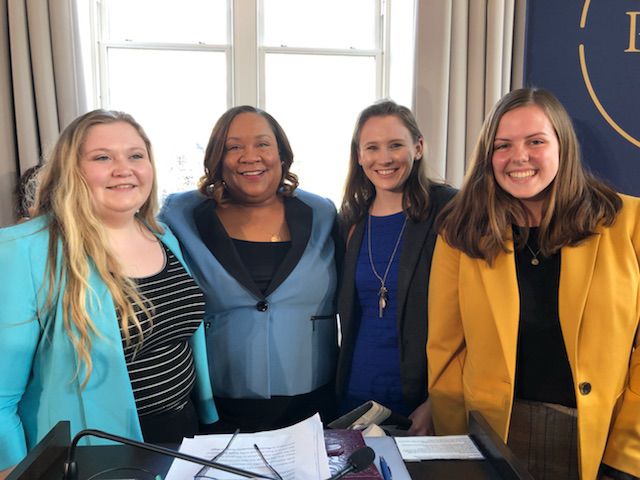Journalism isn’t dying
From left to right: McKenna Horsely, Kernel managing editor; Dana Canedy, administrator of the Pulizer Prizes; Sarah Ladd, Kernel opinions editor; Bailey Vandiver, Kernel Editor-in-Chief, all stand together at the 2019 Pulitzer Prize presentation at Columbia University in New York, New York, on April 14, 2019. Photo provided by Sarah Ladd.
April 16, 2019
I will never forget the first time I said out loud, “I want to be a journalist”. The first comment on my chosen profession (or calling, as I prefer to call it) was, “But you can’t make any money writing.” While that’s a common sentiment surrounding the arts and non-STEM professions, another striking one when it comes to journalism is this idea that journalism is somehow dying, or sick or on its way out entirely. Through my four years of college, I’ve heard quite often that there won’t be jobs in journalism in 10 years, that robots will be doing all the reporting soon, etc.
Though I have never bought into these ideas, I must say that recent events have renewed my belief that journalism at its core is now stronger than ever, and we can expect that it will remain so strong for the duration of our country.
On Monday, April 15, I was privileged to be among a small group of Kernel editors who were selected by lottery to attend the Pulitzer Prize announcements in New York on Columbia University’s campus. The Student Press Law Center hosted students as part of 2019 being the Year of the Student Journalist. This would have been an incredible honor no matter who you are, but I felt so honored to be included in this group as I prepare to graduate college in a few weeks and enter “the real world”. It was a positive note for me to leave on, and I couldn’t have been more excited to be on such an historical campus witnessing such a historical event.
During my time at the Pulitzer Prize announcements and immediately beforehand at a pre-party hosted by the SPLC, I reflected on all the negative things we hear as members of the press. For one day, I was surrounded by completely like-minded people who understood the value the news media has in our democracy. Not only was it mentally and physically refreshing to be a part of this slice of history, but it struck me so strongly that this tradition of rewarding the most excellent among us has continued since 1917, and its standards remain the same and its tradition remains strong.
The Pulitzer Prizes for journalism, I realized this week, are about much more than honoring the best journalists in our world, though. They are about making a statement that the press is alive and well and competes at the highest levels, demonstrating truth-telling and public service against all odds and in the face of humiliation, polarization, torture and sometimes death.
I heard multiple people say at the Prizes that each era of journalism has been labeled the toughest one, and yet this estate continues to go forward strongly. Nothing could be more encouraging and inspiring for me as I enter the workforce in this profession as a young aspiring journalist.
As Joseph Pulitzer once said, “Our Republic and its press will rise or fall together. An able, disinterested, public-spirited press, with trained intelligence to know the right and courage to do it, can preserve that public virtue without which popular government is a sham and a mockery. A cynical, mercenary, demagogic press will produce in time a people as base as itself. The power to mould the future of the Republic will be in the hands of the journalists of future generations.”






























































































































































